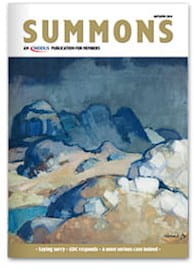THERE is a sign that I regularly pass. It flashes, without exception, at drivers instructing them to “slow down” irrespective of their speed.
I confess that I always feel irritated by this instruction: I drive within the speed limit. While this may sound grumpy, I have tried to turn my irritation to a better purpose. It has prompted me to think about ethical discretion and the contribution of systems. What conditions or types of system make it likely that people will use their discretion well and flourish?
Sociologists have identified particular characteristics as specific to the “professions”, including specialist expertise, admission by credentials, high social status and state-sanctioned self-regulation. One of the defining characteristics of a profession is discretion. The law, regulators, professional bodies and employers may set standards and provide the framework within which that discretion is negotiated. However, on a day-to-day basis, all professionals make judgements about how to use their discretion.
Individual clinicians regularly interpret professional guidance to determine what is the best – or at least the better – option given a particular set of circumstances or variables. That is how it should be. Professional discretion recognises and allows for the complexity and particularity of clinical work. Sometimes exercising judgement involves significant, even momentous choices, such as whether to proceed in a high-risk situation. Most of the time, discretion is enacted via a series of apparently “routine”, perhaps even unnoticed, choices. Every-day questions, such as whether to give advice over the ‘phone, how to prioritise time, which first-line treatment to prescribe and how much information to share at handovers, are matters of discretion. Yes, there are guidelines and standards but each professional will interpret those according to his or her experience, values and preferences.
Although discretion is an inherent part of being a professional, it is not always considered to be an unequivocal force for good. Indeed, professional discretion, particularly perhaps that of doctors, has often prompted suspicion and criticism, and sometimes with good cause. Since George Bernard Shaw wrote scathingly about professions being “a conspiracy against the laity”, attention has been called to the power (and abuses of the same) that comes with professional discretion. Power and privilege will likely endure. Postprofessionalism and de-professionalism are interesting (really) theoretical models, but they cannot eliminate the stubbornly constant imbalance that resides in clinical work. The patient has a problem and needs the clinician’s expertise or skills. The patient is dependent in a way that the professional is not in the encounter. The trick then is not to seek to eliminate power, but to recognise its inevitability and to facilitate mutual trust.
Most of the clinicians with whom I work acknowledge both the privilege and burden of discretion. In my experience, they are acutely aware of their responsibilities. Many recount situations in which exercising discretion has been difficult. Just as clinical expertise and confidence develop with time and experience, so too does skill in recognising situations of discretion and exercising judgement. Yet if people are working in a system that is dominated by directives and instructions that are issued to everyone without appreciation of, or attention to, context and individual circumstance, what it is to be a professional is devalued.
The capacity to be aware of professional discretion and to exercise judgement is inevitably diminished by a directive and controlling culture. What’s more, if those directives and instructions assume that professionals are either doing or about to do “the wrong thing”, it is more than undermining and demoralising, it is a fundamental challenge to professionalism, considered practice and ethical engagement.
Some might argue that trust is earned rather than an entitlement. Others may cite high-profile examples of trust in healthcare institutions and staff being misplaced or abused. However, to create systems around “worst case scenarios” or “bad apples” is to disregard and potentially to undermine the ethical commitment and professional identity of the majority. Changes to governance and increased regulation may be understandable reactions to failures of care, but there are significant risks to systemic changes made in the name of accountability. Ever-greater instruction and surveillance represents a diminution of trust that matters enormously if we want clinicians to reflect on their discretion and to make good professional judgements.
If reflection and discussion are replaced by unthinking obedience (or even unthinking disobedience), we will all be ethically poorer. Environments in which compromised standards are assumed and increasing numbers of commands are issued irrespective of individual conscientiousness or performance are damaging. Instructions that are unfeasible or irrelevant are more than irritating; they reflect mistrust and disregard professionalism. At worst, they create a toxic environment in which people are neither valued nor expected to behave well.
All communication has a moral dimension, even road signs.
Deborah Bowman is Professor of Bioethics, Clinical Ethics and Medical Law at St George’s, University of London
This page was correct at the time of publication. Any guidance is intended as general guidance for members only. If you are a member and need specific advice relating to your own circumstances, please contact one of our advisers.
Read more from this issue of Insight

Save this article
Save this article to a list of favourite articles which members can access in their account.
Save to library